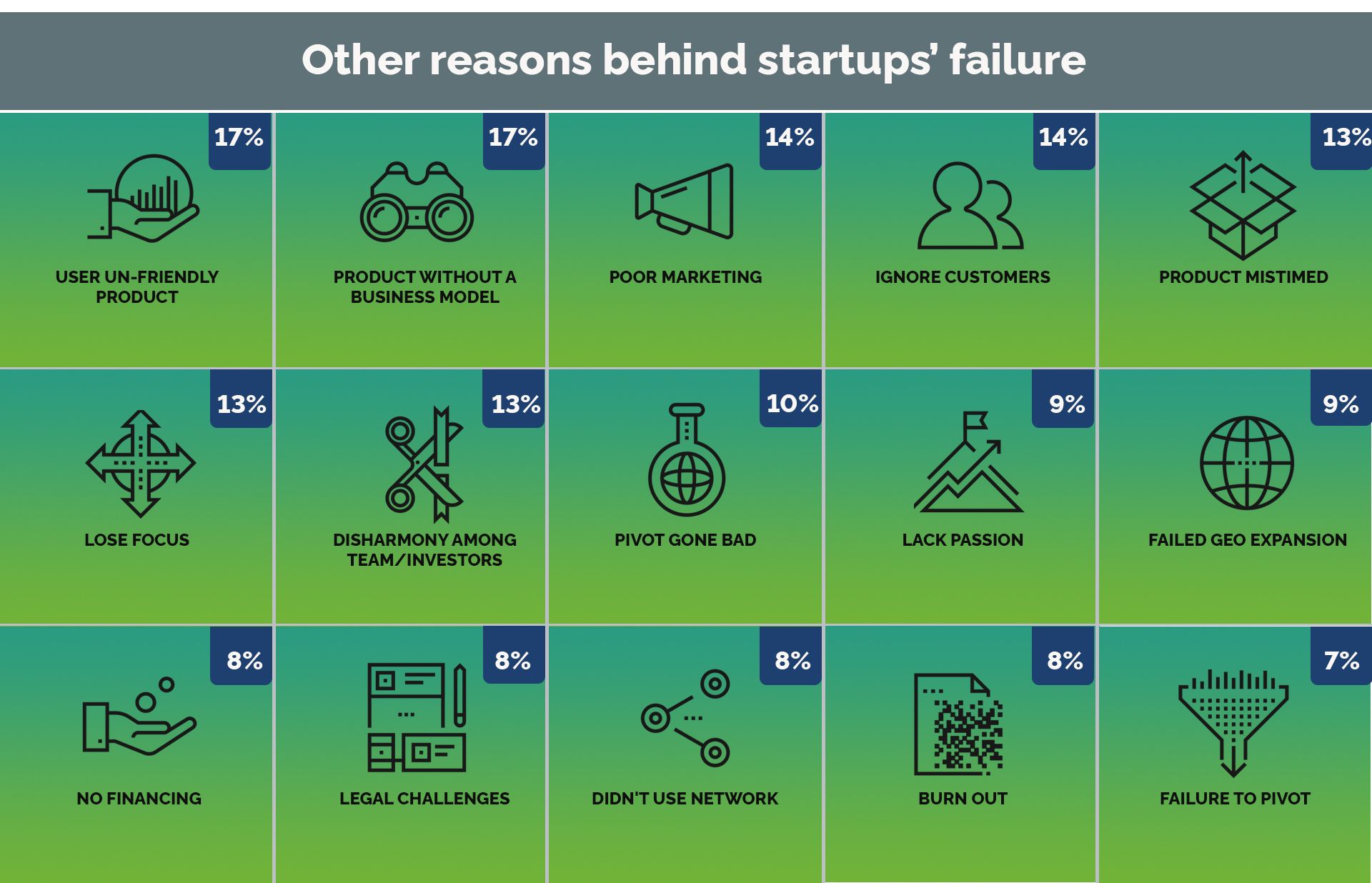“If only I could have had the budget I needed to scale”; “Customers didn’t fully understand the advantages of using our service”; “If only we had been faster on the market, then we could have out-performed the competitors”; “The team was not up to the level of the task”
These are only some of the reasons that startup founders use to explain their lack of success, but they don’t tell the whole story. We hardly ever are able to see the actual structural issues behind their business plans without taking a deeper look at their ideas themselves.
Reality shows insist that almost half of startups fail because there is no market need for their product. CB Insights recently put together a list[1] of the key reasons behind startup failure, analyzing over a hundred startups, postmortem.
Unsurprisingly, the real reasons are quite different from our list of what most founders claim.
We all prefer success stories, but learning from failure is the best way to ultimately reach a point of success. Before making any financial commitment to a startup, an investor must first understand why other companies fell out of market:
1. No Market Need (42%)
One of the primary values of startups is bringing unexpected solutions to problems that customers don’t even realize they have. When Jeff Bezos brought Amazon to the market, consumers were already quite happy with their traditional shopping methods. Similarly, when Microsoft introduced Windows, the majority of its future customers didn’t even know they needed a computer. While identifying these niche issues could be a reason for great success, it is also extremely risky; developing solutions for problems that don’t affect the everyday lives of consumers could often translate into wasting time on solutions for problems that don’t really exist. According to the study, this is the main reason for a startup’s failure.
2. Ran Out of Cash (29%)
It is a known fact that money is a key resource for starting a company. It is necessary to ensuring that employees are paid, that the product is developed, and that the service is properly promoted. The inherent risk of starting a company stems from the fact that it is often difficult to secure funds, as well as to effectively plan and execute a business model. Any early stage company could find itself in a situation where funds are lacking. As an investor, you might want to see be reassured that your investment is safe with two vital pieces of information: first, a roll out plan with gradual MVP launch, and second, a “plan b” in case of a scarcity of cash.
3. Not the Right Team (23%)
When in doubt, look at the people! It is more likely that a talented and committed team will be able to yield great results from an obvious business idea, than that a dysfunctional team will be able to transform a tremendous concept into a prosperous company. James Altucher once declared that he once pulled back an investment that he had already committed to after hearing one of the founders complaining about the other. No matter how good the business idea is, if the team members are not dedicated to each other, then the startup will most likely sink.
4. Get Outcompeted (19%)
Competition is part of a business plan and should be the bread and butter of any decisions made by a seasoned investor. Defining who the competitors are is essential when considering a financial commitment. Can a structured corporation launch, in the short run, a similar product? Did the team identify a contingency plan to address this scenario? Is the USP strong enough in case of increased competition?
5. Pricing/Cost Issues (18%)
Many say that pricing relies on several variables: cost, elasticity, distribution, market share, additional benefits… Wrong! Pricing depends on the value that a product delivers to customers. If a startup has a wide portfolio offering different price points, then it is definitely a positive sign for angel investors, as it allows customers to be brought in at the lowest price point with the option of upgrading with clear and tangible benefits. Issues regarding the cost of production are not the only possible pitfalls of a growing business, but they should not be underestimated in any case. In most situations, a third party technical evaluation is necessary in order to establish the true cost of production.
[1] https://www.cbinsights.com/research/startup-failure-reasons-top/

[1] https://www.cbinsights.com/research/startup-failure-reasons-top/

